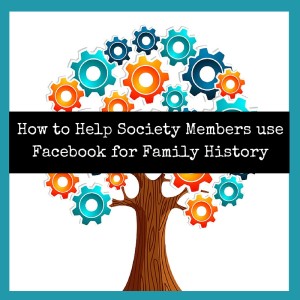Ways to Help Family History Society Members Use Facebook
 So your society elected to create a Facebook page, then what’s next? In addition to posting content you can support members who are not on Facebook. For example, they may want to understand more about social media so they can join up and use Facebook safely. Then for Facebook users, to help them make the most of Facebook to advance their family history research.
So your society elected to create a Facebook page, then what’s next? In addition to posting content you can support members who are not on Facebook. For example, they may want to understand more about social media so they can join up and use Facebook safely. Then for Facebook users, to help them make the most of Facebook to advance their family history research.
Catchup: I posted about Why should Your Society Get a Family History Facebook Page and the types of content posted on my local Caloundra Family History Facebook page wall. This post details the first training session for members at our General Meeting back in July.
Presentation for Members Using Facebook for Family History Research
My first presentation to the Caloundra Family History meeting included a topic focusing on members who have not signed up yet because security and privacy fears. It is important to find out your members needs before embarking on any training.
The turnout was much higher than I expected. This prompted me to write this post and to share the slides of my presentation. The slides are just dot points and images I spoke to and answered question about.
Helping Members use Facebook Slide Presentation
Help Family History Society Members Use Facebook from travelgenee
Possible lessons, ideas and next steps to support members use Facebook
- For members using Facebook: Create a presentation going into more detail about using Facebook for Genealogy.
- For Facebook Newbies: Some individuals need support for problems as these can be major stumbling blocks for potential users gaining the benefits of being on Facebook. The level of discomfort using Facebook is increased by lots of individual issues. Example queries where: How do I change my photo or how to I join two profiles together as I started a second one? Or how to create an alternative web-based email address so that you do not need to use your personal email address.
- More copies of the notes were required and were issued via email to those who missed out.
- A repository of links might be useful. Until our beginner Facebook users get going they will miss many useful links, ideas, jokes and even member pics. Others miss links because Facebook only shows a proportion of posts on walls. Trying to find older posts on Facebook is not easy and can be time consuming. For example I wanted to access a link to a page with maps on parishes in England and struggled to find it.I started blog posts on TravelGenee summarising many of the Facebook posts. It is so much easier finding them with the tagging and search available in blogs than returning to Facebook and find the posts. I am not sure how long I will keep this up.
- Once a Societies Page is up and running it can be promoted in other society media. Eg on websites, in newsletters, etc
- Perhaps a section in the newsletters answering questions about Facebook for Family History.
If you are looking at or have already opened a Facebook Page for your society then supporting members to use Facebook is part of having a social media option.
Note: These are my views from the recent experiences I have had collating content for Facebook and not those of the society.
Does your society have a Facebook page?
